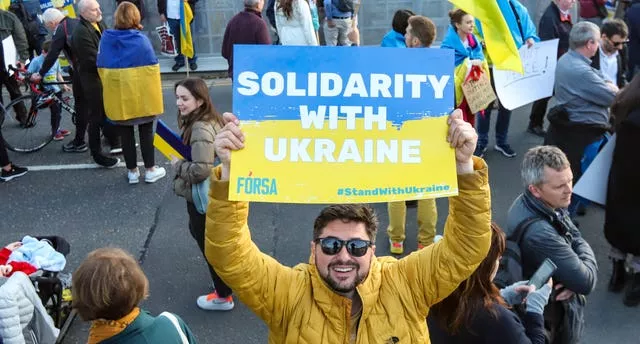The Ukrainian refugee crisis will start to cost Ireland from 2023, the Taoiseach has said.
An estimated 14,611 Ukrainians have arrived in Ireland so far, with 30,000 expected by the end of April.
There have been 22,657 offers of accommodation by the public, and the Irish government is reportedly considering a tented facility at the Defence Forces’ Gormanston camp.
Micheál Martin said the Irish government does not anticipate having to borrow for it this year, explaining they hope to allocate a “significant proportion” of a Covid contingency fund to the challenges arising from the Ukrainian refugee crisis.

“But into 2023 there will be costs and therefore the budget towards the latter part of the year will have to reflect that, and that does create challenges for us economically and fiscally, and we’ll approach all of this in the context of the forthcoming budget and we’ll work also with our European colleagues in the European Commission in terms of other collective responses we can bring to bear,” he said.
“But the economic implications of this war are there. They are there to be seen in continuing increases of energy prices, in food security issues, some aspects of agriculture and food are already bearing the brunt of this because of higher input costs, the pig sector in particular.
“These were very viable enterprises and now are under pressure and we have responded sectorally to some of these areas and we will continue to do that.
“Over the next while, we will be targeting those most in need and those on lower incomes.”
Mr Martin said the spending will have to be factored in to next year’s budget.
He also said he cannot be definitive about the number of refugees who will arrive in Ireland over the coming weeks and months.
Up to 600 Ukrainians are arriving in Ireland every day.
Mr Martin said that the Government will consider modular construction, however it could take a number of months to complete.
The Fianna Fáil leader said the Government will have to be innovative in its response to accommodate the large number of fleeing refugees.
He also acknowledged a low uptake in Covid vaccines among people in Eastern European countries.
He said that people arriving from Ukraine are being offered Covid-19 jabs for those who have not yet received one.
“We do know that certain Eastern European countries, the take-up was low because of historic issues with state and authorities in the past around vaccinations and so on,” Mr Martin added.
Statement by Minister Coveney on the expulsion of Russian Embassy officials
👉https://t.co/G4z8fm6uqw pic.twitter.com/pQDF2k0wPo— Irish Foreign Ministry (@dfatirl) March 29, 2022
“But we are confident, that with proper targeted approaches, we can increase the level of vaccination.”
Mr Martin also said he believes there is “strong political agreement” within Ireland.
“I just came from the Dáil and I think that was in evidence across the floor of the House in terms of supporting refugees,” he added.
“I don’t think people need reminded of the horrors of what these people are fleeing and the war is really having a terrible, traumatic impact on people.
“This is a war-time situation. It’s a war-time response.”
Mr Martin also refused to be drawn on why Ireland expelled four senior Russian officials.
The Government said the officials have been asked to leave the country because their activities have not been “in accordance with international standards of diplomatic behaviour”.
The individuals will be given a number of days before they have to leave the country, Mr Martin said.
Asked why the Government would not disclose the reason behind the concerns about the Russia officials, Mr Martin said: “Historically, we are very clear in terms of how we deal with these situations.
“We did have a security briefing in relation to these four individuals, but also in relation to a general situation pertaining to activities and so forth.
“We don’t divulge security information at that kind. One question can lead to another question, and we take very seriously the presentations I’ve received from the Garda Commissioner and Chief of Staff.
“We’re very clear that the reasons were well-founded for doing this under the Vienna Convention, and on the basis that the activities of these individuals was not in accordance with international standards of diplomacy.
“I think people can read various things from that. But fundamentally, there was a security premise underlining the decision.”







